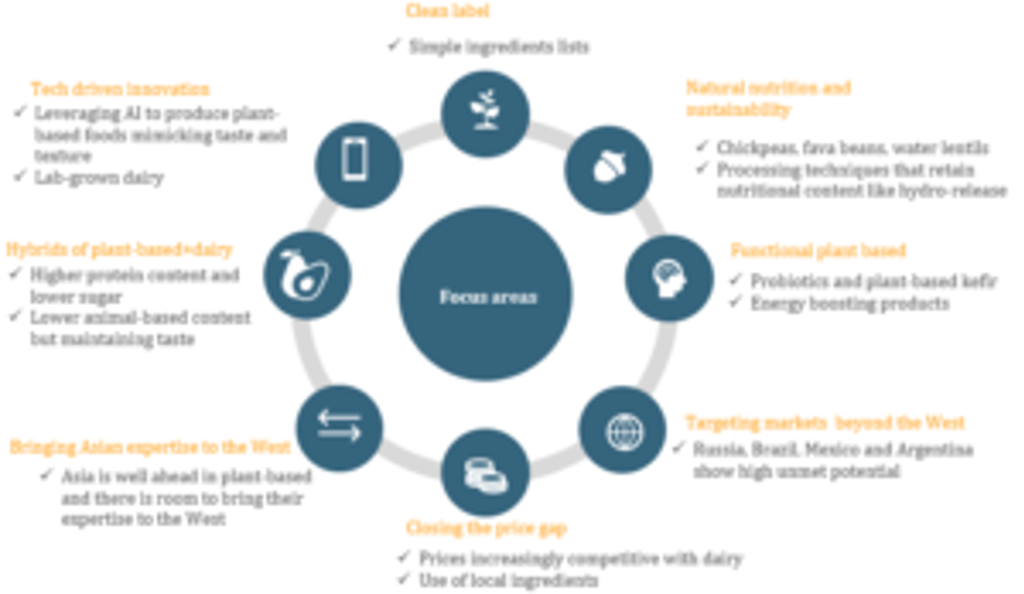Dairy is under siege and there is a wide range of reasons responsible for its slow performance in Western markets. Market saturation, health concerns and consumer awareness of intensive dairy farms are key.
In parallel and connected to these, the rise of “flexitarianism” has led to the boom of plant-based dairy alternatives, also contributing to the weak performance of dairy.
Health reasons and flexitarian diets drive the boom of plant-based dairy alternatives
The challenge for many years has been how to market plant-based products and what is now clear is that vegans constitute a reduced group of consumers, hence they are not the driving force of the plant-based boom. However, flexitarians represent a massive opportunity in the food industry.
According to Euromonitor International’s Lifestyle Survey, those who are restricting certain animal-based products but not following a strict vegan/ vegetarian diet account for nearly 50% of consumers globally. This is the key driver of the plant-based craze.
Interestingly, unlike vegan diets, ethical reasons and environmental concerns are not top of mind for consumers following dairy-free diets, health and digestive reasons are the key motivators, according to the same survey.
In the pursuit of a more diversified plant-based milk experience
As plant-based dairy continues to surge in popularity, the spotlight is on Western countries, where there has been substantial growth. This includes Australasia, where average sales per person are very high and delivering strong growth.
Non-soy milk alternatives are the most successful variants, with global retail value sales of USD10.6 billion in 2019. Consumers are increasingly looking beyond soy to newer plant alternatives that are less likely to be sourced from genetically modified crops, are allergen-free and carry a lower carbon footprint.
There is also growing interest in ingredients associated with an added nutritional value. For example, oats are linked to high fibre, walnuts and its omega-3 content and pea with high protein. Ancient grains in general, including quinoa, millet and teff are also in the spotlight and although being a niche, represent an important opportunity given that they are not genetically modified and boast an impressive nutrient profile.
Clean label, functionality and tech-driven innovation among the top areas to bring to the spotlight
In a highly competitive sector, differentiation is essential to engage further with consumers and several strategies can be brought to the spotlight to continue shining in this category.

One of the focus areas in the next years will be clean label dairy-free offerings. The rise of plant-based alternatives is primarily driven by consumers perceiving them as a healthy option, yet these products are generally heavily processed and contain lengthy ingredients lists. This clashes with the increasing demand for clean label foods.
According to Euromonitor International’s Lifestyle survey, 36% of global consumers are seeking “all natural” claims in the foods they buy. This opens the debate about whether an increase in consumer concerns on how clean-label plant-based products are will impact the continued growth of the category.
Together with it, functional ingredients can contribute to differentiate in a highly competitive market. Targeting pockets of growth such as energy boosting, digestion and brain health among others could help to further engage with consumers. Similarly, as newer ingredients appear, those with extra nutrition and sustainably sourced will bring further potential.
Tech-driven innovation will also be an area of huge development in the coming years. The Chilean start-up Not Co is the bold example of the machine learning application could have in the evolution of plant-based dairy.
Not Co uses AI to map out the molecular composition of animal-based ingredients and replace them with plant-based ones of identical or similar molecular composition, to maintain the taste and texture of the original products. This technology can open a new door to the future of plant-based dairy alternatives.
For a more detailed analysis on the topic, please read the full report Post Dairy Era: The Unstoppable Rise of Plant-Based Alternatives.
